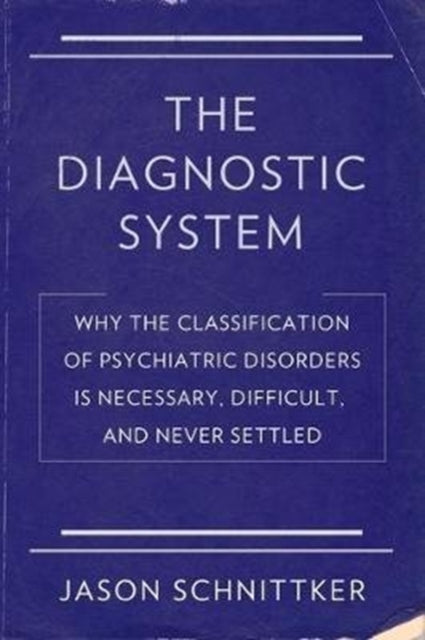JasonSchnittker
Diagnostic System: Why the Classification of Psychiatric Disorders Is Necessary, Difficult, and Never Settled
Diagnostic System: Why the Classification of Psychiatric Disorders Is Necessary, Difficult, and Never Settled
YOU SAVE £3.82
- Condition: Brand new
- UK Delivery times: Usually arrives within 2 - 3 working days
- UK Shipping: Fee starts at £2.39. Subject to product weight & dimension
Bulk ordering. Want 15 or more copies? Get a personalised quote and bigger discounts. Learn more about bulk orders.
Couldn't load pickup availability
- More about Diagnostic System: Why the Classification of Psychiatric Disorders Is Necessary, Difficult, and Never Settled
The American Psychiatric Associations' Diagnostic and Statistical Manual is the primary resource for classifying mental illness, but it has created controversy. Jason Schnittker's book "The Diagnostic System" examines the multiple actors involved in crafting the DSM and the many interests that the manual hopes to serve. He shows that the classification of psychiatric disorders is best understood within the context of a system that involves diverse parties with differing interests. Progress toward an ideal is difficult, and revisions to diagnostic criteria often serve the interests of one group at the expense of another. Schnittker urges us to become comfortable with the socially constructed nature of categorization and accept that a perfect taxonomy of mental-health disorders will remain elusive.
\n Format: Paperback / softback
\n Length: 368 pages
\n Publication date: 24 November 2020
\n Publisher: Columbia University Press
\n
Mental illness is a multifaceted phenomenon that encompasses both natural and societal influences. It is a complex interplay between biological, behavioral, and social factors. While mental illness is rooted in the brain, it also manifests in the mind, creating a challenge for accurate classification and diagnosis. The American Psychiatric Association's Diagnostic and Statistical Manual (DSM) is the primary resource used to categorize psychiatric disorders, but no edition has achieved a definitive solution, leading to ongoing controversies. In his book "The Diagnostic System," sociologist Jason Schnittker delves into the complex process of creating the DSM and the various interests it seeks to serve.
The DSM is a tool designed to classify mental illness, but its effectiveness is a subject of debate. Some argue that it provides a useful framework for understanding and treating mental disorders, while others criticize it for being too broad or subjective. Schnittker examines the multiple actors involved in crafting the DSM, including psychiatrists, psychologists, sociologists, and policymakers. He highlights the diverse interests that these actors have, such as improving diagnostic accuracy, developing reliable treatments, and advancing scientific knowledge.
One of the key challenges in defining mental illness is the need to balance the interests of different stakeholders. The public seeks a better understanding of personal suffering, while mental-health professionals seek reliable and treatable diagnostic categories. Scientists aim to define mental disorders in terms of their natural causes, while policymakers prioritize cost-effectiveness and public health outcomes. However, even the best classification system cannot satisfy all of these interests simultaneously. Revisions to diagnostic criteria often serve the interests of one group at the expense of another, leading to debates and controversies.
Schnittker encourages us to embrace the socially constructed nature of categorization and recognize that a perfect taxonomy of mental-health disorders will remain elusive. He argues that decision-making based on evolving and fluid understandings of mental illness is not a weakness but a strength. By accepting the limitations of classification, we can develop more nuanced and effective approaches to mental health care.
In conclusion, mental illness is a complex phenomenon that requires a comprehensive understanding of both biological and social factors. The DSM is a valuable tool for categorizing mental disorders, but its effectiveness is limited by the diverse interests of stakeholders and the inherent complexities of the human mind. By recognizing the socially constructed nature of classification and embracing evolving understandings of mental illness, we can develop more effective and compassionate approaches to mental health care.
\n Weight: 462g\n
Dimension: 143 x 221 x 24 (mm)\n
ISBN-13: 9780231178075\n \n
This item can be found in:
UK and International shipping information
UK and International shipping information
UK Delivery and returns information:
- Delivery within 2 - 3 days when ordering in the UK.
- Shipping fee for UK customers from £2.39. Fully tracked shipping service available.
- Returns policy: Return within 30 days of receipt for full refund.
International deliveries:
Shulph Ink now ships to Australia, Belgium, Canada, France, Germany, Ireland, Italy, India, Luxembourg Saudi Arabia, Singapore, Spain, Netherlands, New Zealand, United Arab Emirates, United States of America.
- Delivery times: within 5 - 10 days for international orders.
- Shipping fee: charges vary for overseas orders. Only tracked services are available for most international orders. Some countries have untracked shipping options.
- Customs charges: If ordering to addresses outside the United Kingdom, you may or may not incur additional customs and duties fees during local delivery.


